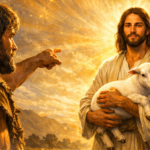“The Mystery of His Will” – Ephesians 1:8-9
Introduction # 1 – context
Let me be honest and frank and upfront with you right off the bat today. A month or so ago, as I was looking ahead to the Bible readings for this Sunday, I was struck quite quickly with the word ‘wisdom’ as it appeared prominently in all three of the Bible lessons. I translated that into a potential sermon theme of “Wisdom for a New Year.” It sounded familiar in my mind, as if I had preached that before – maybe even here at Hope Lutheran. So, I looked back on my computer to previous sermons to see if my thoughts were substantially different from something that I had maybe preached in the past. You may know that our Bible readings generally repeat every three years, so that’s where I started – 3 years ago. Oh, but then, there are not always 2 Sundays after Christmas Day and before Epiphany – the account of the visit of the Magi. So, I ended up seeing that 2020 had 2 Sundays after Christmas AND the Bible readings were exactly the same AND the sermon was titled “Wisdom… from God… for a New Year!!” No wonder that theme and content sounded familiar in my getting-older and forgetting-quicker mind.
But the question, the issue that I didn’t address a year ago was: did we know, did we have any idea what wisdom we would need individually, corporately (church, society) to get through that 2020 calendar year? The answer is “NO” – we had no idea what we would face in 2020. And we have no idea what we will face in 2021 either. What impact will the new strain of the corona virus have on our world? Will the vaccines be successful in combating the virus and in returning life to some semblance of normalcy? Will other global challenges also return to normal – terrorism, climate change, war?
So, trusting that you also have a forgetting-quicker mind, I want to pull out some of the main things from last year’s Christmas 2 sermon, and then add a new little ending about the “mystery of His will” – a phrase found in the Epistle reading from Ephesians 1, and a phrase that is relevant as we close the books on 2020 – the mystery of God’s will, indeed!
Introduction # 2 – wisdom
So, it was quite obvious that wisdom was a common word / noun in all three readings:
In 1 Kings, Solomon asked for wisdom as he began his kingship over Israel.
In Luke 2, Jesus demonstrated wisdom in his theological conversations with the teachers in the temple, and He grew in wisdom.
In Ephesians 1, Paul writes that, in His wisdom, God lavished on us redemption, forgiveness and grace.
There is a distinction between knowledge and wisdom. Knowledge is comprehension of facts; wisdom is what to do with those facts, that knowledge, and how to apply it for the good of one’s self and others, and making good decisions with the information that you have.
Someone has coined the truthful principle: “Making good decisions comes from experience; experience comes from making bad decisions.”
1. Solomon asking for wisdom
As he became king, Solomon realized that he didn’t know everything, certainly not everything needed to be a king. He did know some things… He knew the gifts he had received: great & steadfast love of God; the throne of his father, David; God’s chosen people, innumerable.
Solomon knew his own limitations – age (“I am but a little child” – figure of speech… he was already a father), lack of experience (“I don’t know how to go out or come in”), lack of discernment (“that I may discern between good and evil”). He knew the challenges associated with the administration and leadership of God’s chosen people. He was humble about it, and willing to learn and grow.
Reflecting on Solomon’s responsibility and opportunity, Martin Luther wrote: “If you are a judge, a bishop, or a prince, you should not feel ashamed to fall on your knees and say: ‘Lord God, Thou hast appointed me… guide and teach me, give me counsel, wisdom, and strength to attend successfully to the office committed to me.’”
That’s what Solomon did. If he was to be a good king, a successful king, and more importantly a Godly king, he would need God on his side, and God’s wisdom in his heart and mind.
It was in a dream that God gave King Solomon a carte blanche offer – ask for whatever you want and I will give it to you. Solomon’s prayer in response was simple, faithful, and God-pleasing: “Give your servant an understanding mind to govern your people.” Solomon understood what an honour it was to be king over Israel, and he wanted to act in obedience to God, to discern between good and evil, to rule wisely and justly over God’s special and holy and chosen people. God answered his prayer affirmatively.
2. Jesus grew in wisdom
Let’s turn to our Gospel reading in Luke 2. Did you notice that the story of Jesus at the Jerusalem temple during Passover time when He was 12 years old was bookended by statements about Jesus growing in wisdom? V. 40 – the bridge from the infancy narratives to this account – says “the child grew… filled with wisdom.” The concluding statement of Luke 2 says that “Jesus increased in wisdom and in stature and in favour with God and man.” So Jesus grew physically – in stature. He grew spiritually – in favour with God. He grew socially – in favour with man.
Let’s spend a moment, though, on the fact that Jesus grew intellectually – in wisdom. The evidence came in the story in the temple. After the Passover, when Mary and Joseph discovered that Jesus wasn’t in their Nazareth-bound caravan, they returned to Jerusalem to find Him discussing theology with the rabbis. There He was… growing in wisdom… learning from, then challenging, then asking questions of the religious leaders of the day in the temple.
Did you pay attention to the opinion of the people? “All who heard Him were amazed at His understanding and answers.” Solomon prayed for an understanding mind. Jesus had one… even at age 12. He could apply His knowledge and the truths of God’s Word to situations and interpretations and case studies of how the Law related to the Kingdom of God, and how they both related to people’s lives. That’s what wisdom is. That wisdom was evident later in Jesus’ ministry in His answer to challenging questions and situations:
When asked about paying taxes, He said: “Give to Caesar what is Caesar’s, and to God what is God’s.”
When asked about the greatest Commandment, He replied: “Love God with your entire being and love your neighbour as yourself.”
When faced with the dilemma of whether or not to stone an adulterous woman, He wisely responded, “Let him who is without sin throw the first stone.”
When challenged about picking grain on the Sabbath, Jesus concluded: “The Sabbath was made for man, not man for the Sabbath. I am the Lord of the Sabbath.”
Jesus was wise… no question!
3. Wisdom for a new year
What about you? As we begin a new calendar year, for what do you anticipate you will need wisdom in this coming year? Last year I suggested you may need wisdom for raising your children in a challenging (and dangerous) world, and wisdom for making decisions in the workplace, and wisdom for investing your money appropriately for the future, and wisdom for considering how to serve God in and through the church, the workplace, the family.
There may be extra nuggets of wisdom that you will need for this year: Do you get a vaccine? When do you resume gatherings with your family? When do we as a church resume gatherings for public worship? How do you handle health and safety practices in the workplace as the restrictions hopefully loosen in this calendar year? What will vacation plans look like?
Before we consider wisdom for a New Year, let’s first recall some vital facts, some knowledge, as revealed in Ephesians 1.
First, let’s remember who we are. Paul writes that we are adopted sons and daughters of God through Christ Jesus. We have an identity, a status, a relationship with God. That’s a good and important place to start.
Second, let’s remember what we have. Paul seems to trip over all of the words as he catalogs in a seemingly endless, run-on sentence “every spiritual blessing” that we have in Christ:
Chosen in Christ before the foundation of the world Holy
Blameless Predestined Adopted – that’s our status!
Redemption Forgiveness
Riches of God’s grace lavished on us, Paul says, because of God’s wisdom!
Inheritance Hope in Christ Word of truth
Gospel of Salvation Promised Holy Spirit
Remembering all that, and being awed by it, true spiritual wisdom for the new year is found in applying that status and those blessings to the situations of everyday life. I can’t apply every one of those blessings to every one of you for every situation of your life, but allow me to generalize for a couple of them.
Applying your status as God’s son or daughter to everyday life will affect how you speak, how you act toward others. You will realize that you are not just your own person, but you are God’s person, God’s representative. That will season your conversations with grace and your actions with love and compassion.
Applying redemption through Jesus’ blood and forgiveness for your trespasses to everyday life will have at least two very separate impacts on your life going forward. First, there is no need to be discouraged and despondent over your own sins, and to beat yourself up with guilt about them. There is still a need to be humbly repentant about them, but then true spiritual wisdom will leave those sins at the foot of the cross. Second, knowing that you are forgiven of your great and many sins will lead to a genuine attitude of willing and full forgiveness when someone sins against you and is likewise humbly repentant. Wisdom for a new year takes the forgiveness you have received from God and extends it out toward others.
Applying the hope that we have in Christ and the inheritance of heaven guaranteed in the Holy Spirit will give us confidence as we face trying times in this new year. Whether it is facing COVID personally, or anguishing over the escalation of evil in our world, or having the financial rug pulled out from under you, applying the knowledge that God is with you, that nothing in this whole world can separate you from His love, and that there is a new, resurrection life beyond this life gives you courage and patience to walk through worldly hardships with a view toward the future, toward eternity.
4. The mystery of His will
But even as we enter a new year, maybe especially as we enter this new year (after last year), we may really question the mystery of God’s will.
Why did God allow 2020? – with a pandemic virus, and lots of deaths, and lots and lots of hospitalizations, and economic collapse, and blacks shot by police, and “black lives matter” protests, and deaths of our loved ones that couldn’t even be remembered with a funeral or memorial service. Why did God allow our seniors to be isolated for months on end, and why did God allow churches to be closed up, even for Christmas Eve? That is certainly the mystery of God’s will. I can’t explain it. No one can.
But there are some questions that we can answer… for ourselves… as we wisely reflect on the past year.
What have we learned in 2020? Maybe that a lot of us can work from home, at least some of the time. Maybe that we can live without sports and entertainment. Maybe that we don’t absolutely need to travel so much. Maybe that we really need the social companionship of other human beings to be fully whole and healthy. Maybe that we truly value family (even though ours is not a perfect Norman Rockwell family) and we miss opportunities to eat together and visit together. Maybe that we can worship God individually or as a family at home – we don’t like it, but we can. Maybe you learned how important singing out loud, and joyfully, is as a part of your worship life, and how much we want to be in people’s lives, and how much we want to hug and eat potlucks together. (Those days are coming…)
How have we grown in this past year?
Maybe you grew in your marriage or family relationships because you were gently forced to spend more time together. Maybe you grew in your financial accountability because you have had to live with less. Maybe you grew in knowledge because you read more. Maybe you grew in your appreciation for health care workers who needed to use all their knowledge and skills AND WISDOM to keep people alive, or your appreciation for government officials who had to use wisdom to make tough decisions for the good of society. Maybe you have grown in your faith because you spent more time with God, in prayer and devotions.
Jesus asked and answered questions in the temple with the religious leaders. What questions have we asked and had answered in this past year?
The mystery of God’s will is more tied up in Jesus than it is in making sense of the weird and wonderful and wacky things that happened in our world in 2020. The mystery of God’s will is that He would look on us sinners and then, with a heart full of love, lavish His grace and redemption and forgiveness on us through His Son, Jesus.
God came down to earth in the person of His Son, Jesus, born and placed into the Bethlehem manger. Jesus never stopped going down. He went so low as to humble himself to death – even death on a cross… to save us. Although He is the source of truth, He was found guilty of an apparent lie. Although He is the source of light, for three hours He hangs in the darkness. Although He is the source of life, He was crucified, dead… and buried. This is no sentimental or syrupy love. But a fierce love for us. Driven by nails. Marked with scars. Crowned with thorns. And risen from the dead to reign and rule our lives with deep compassion and transforming grace. That is a mystery to be sure. But it is a mystery that God has revealed to us so that we might know, and believe.
In C. S. Lewis’ The Lion, The Witch and The Wardrobe, the White Witch demands the right to execute the traitor Edmund, citing some deep magic from the Dawn of Time. Aslan the Lion, the Christ-figure in the book, offers himself in Edmund’s place. The White Witch accepts, thinking she will thereby defeat her greatest enemy. She mocks Aslan and kills him on the great stone table.
But Aslan reappears alive, thanks to an even deeper wisdom from before the Dawn of Time. He explains that, “When a willing victim who had committed no treachery was killed in a traitor’s stead, the Table would crack and Death itself would start working backward.”
God’s Wisdom-in-the-flesh, our Lord Jesus, was a willing victim who had committed no treachery. He was killed in our stead, but death could not hold Him. He rose from the dead, and forced death to start working backward, not only for Him, but also for us. This is the essence of the mystery of God’s will, and the riches of His grace, which He lavished on us, in His wisdom. With this truth in our back pocket all year long, we can live like Solomon, discerning between good and evil and carrying out our responsibilities with God-given wisdom, we can grow in wisdom like Jesus, and we can wisely apply every spiritual blessing from God to our words and actions in 2021. Amen.






